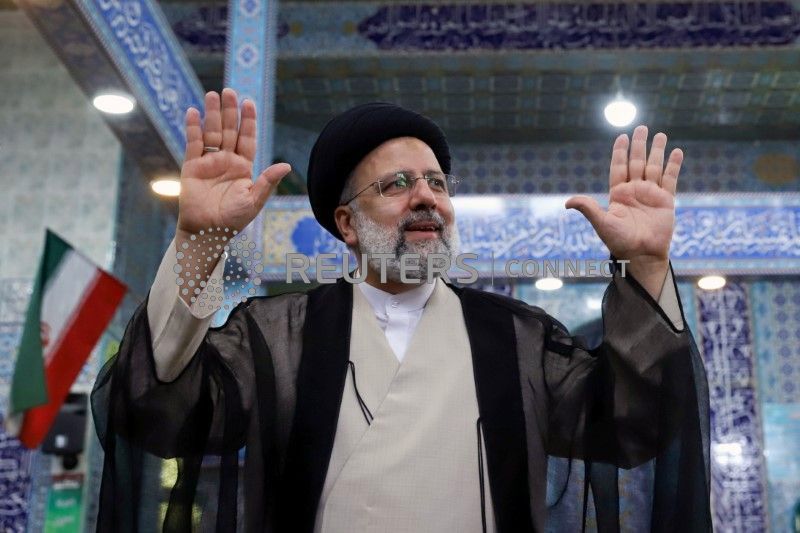
What are the implications of a conservative Iranian presidency and a renewed nuclear deal for the region?
Amid strong speculation about Iran approaching a renewed agreement with world powers over its nuclear programme, the country elected its new president, Ebrahim Raisi. The new head of government will have the opportunity to revive the Iranian economy, improve diplomatic relations, and strengthen geopolitical outreach in the Middle East and beyond.
Governing is prioritising, and the choices the new president is presented with could not be starker or more consequential at this critical juncture.
How this hardline conservative chooses his priorities and manages the potential windfalls from the nuclear deal will go a long way in shaping the future of his country and the Middle East.
This is especially important because the presidential elections lacked basic democratic legitimacy in the eyes of the majority of Iranians, who did not show up at the polls after the regime had manipulated the process in favour of Raisi.
In fact, the 60-year-old Raisi is expected to succeed the like-minded, but sick and ageing octogenarian Supreme Leader Ayatollah Ali Khamenei, who by definition, rules supreme in the Islamic Republic of Iran.
The new Iranian president can choose to go about governing one of three ways.
First, Raisi can prioritise economic investment and reform, sending a clear message that his government will use the economic benefits from a renewed nuclear deal and the new international openings it offers, to improve the livelihoods of ordinary Iranians who have suffered greatly from decades of tough sanctions and isolation.
But to ensure economic transformation, the government will have to also undertake political reforms in order to improve the Islamic regime’s dismal credibility in the eyes of most of its own citizens. This month’s rigged elections have undermined the legitimacy and exacerbated the tensions between the Islamic and the republican/democratic components of the Islamic Republic.
By extension, such an approach would also mean a shift in foreign policy, reining in Iran’s costly regional adventures in favour of healthier trade and cooperation with neighbours.
But no economic, political or strategic reform is possible without tackling the structural corruption and systematic mismanagement that are pervasive in the country, and taking on the influential clerical elites and Revolutionary Guards.
Would Raisi seize the moment to chart a different way forward for Iran? Judging from his long and deep loyalty to the clerical regime, the answer is unequivocally no.
Still, I am giving this scenario a 0-5 percent chance of happening.
Second, Raisi could also choose to maintain the status quo by relying on the revenue from higher oil prices and greater foreign investments, following the renewal of the nuclear deal. He could move slowly to extend a hand to Iran’s neighbours and to European powers on the basis of “mutual respect and mutual interest” – Tehran’s favourite diplomatic phrase.
Iran has greater leverage in Iraq, Syria, Lebanon and Yemen because of its inflated and destabilising role there. It could reverse course by helping to restore security, peace and stability to these struggling countries, earning much goodwill and prestige in the process.
It could even become a guarantor for regional security, as the United States downsizes its military commitments in the region. The same goes for stabilising and improving relations with its Gulf neighbours, notably Saudi Arabia, which could be a win-win for the people on both sides. To be sure, Raisi’s government will not change Iran’s stance on Israel, nor will it boycott those who do.
An attempt to play a role in Afghanistan alongside Pakistan and Turkey will be a telling test for the new president’s intentions and objectives, as NATO withdraws its troops from the country.
Relations with the US will take longer to normalise after four decades of mutual official hostility. The US sanctions on Raisi, imposed only two years ago for his alleged role in human rights violations, will not help improve relations in the short term.
I give this more realistic scenario a 35 percent chance of unfolding.
Third, the new Iranian president could decide to double down on his hardline conservative views and use earnings from higher oil prices and new investments to finance the jaded clerical establishment and further empower the Revolutionary Guards, tasked with spreading Shia-Iranian influence throughout the region.
He could move to take advantage of the instability and precarity Arab neighbours continue to suffer from to expand Iranian influence, the same way it was done in Iraq, Lebanon, Syria and Yemen.
This means further empowering armed sectarian militias, which would lead to more covert operations and assassinations, deepening regional sectarianism, violence and instability. The absence of strategic Arab deterrence to discourage Tehran from pursuing its interest at the expense of its neighbours will undoubtedly entice the new Iranian leadership to go on the offensive.
Likewise, the recently announced shortsighted alliance between a couple of small Gulf countries and Israel could well embolden Tehran to act more aggressively against those who wish it ill.
US military disengagement, albeit limited, and the reduction of its strategic commitments to “traditional allies”, could further encourage the new president to step up Iranian power play to fill the void.
All things being equal, I see this rather pessimistic scenario as having a 65 percent chance of taking place.
That said, it is important to remember that Iran’s politics, like the politics of the region, is not static. Nor are West-East relations. New upheavals are likely in most countries of the region and could exact a heavy toll on Iran.
Likewise, a recalibration of interests and remaking of alliances could potentially change Iran’s calculus under Raisi’s leadership, pressuring him to embrace the second scenario, for the sake of his interest, the national interest, and yes, the regional interest.
He could also, miraculously, embrace the saner and constructive first scenario, setting an example for the region. No harm in dreaming.






